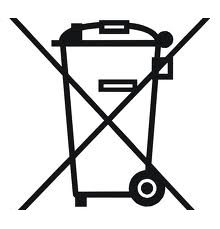Proper battery disposal
Hello friends!
Each of us probably used batteries in his life. Boards, watches, toys, telephones, a lot of other things - there is always something in the house that runs on batteries. And they have the ability to develop their own resource. However, does everyone know what to do with spent batteries? Thrown into the trash with the rest of the household trash? It is not right!
On the battery case, there is almost always a sign in the form of a crossed-out dumpster, indicating that it should not be thrown away with other household waste.

But what is so harmful or dangerous in batteries?
Although the battery may explode, leak and damage your equipment, or be swallowed by your child, it will cause major damage if not properly disposed of.
In general, batteries are chemical devices whose elements react to produce electricity, which we use. These elements are mostly toxic and dangerous.
')
After ejection, the metal coating of the battery is destroyed by corrosion, and heavy metals get into the soil and groundwater, from where it is not far to rivers, lakes and other water bodies used for drinking water supply. Mercury is one of the most dangerous and toxic metals, it tends to accumulate in the tissues of living organisms and can get into the human body both directly from water and by eating foods prepared from poisonous plants or animals.
And if a battery is burned in an incinerator, all toxic materials contained in it will be released into the atmosphere.
According to statistics, the Moscow family annually throws up to 500 grams of used batteries. In total, in the capital 2-3 thousand tons of batteries are recruited. In the United States, Americans buy nearly three billion different batteries annually, and about 180 thousand tons of these batteries end up in landfills all over the country.
It’s hard to imagine how much damage is being done to the environment on a global scale.
It is not recommended to keep at home, as the release of hazardous substances into the air occurs. According to the rules, they must be disposed of at special enterprises. Although the pleasure is not cheap, in developed countries the process of collecting used batteries from the public and subsequent competent disposal is well established. So, in many countries of the European Union, in Canada and the United States there are items for receiving batteries everywhere. In New York, for example, throwing batteries in the trash is prohibited by law . And manufacturers and large stores selling batteries are required to ensure the collection of used batteries - otherwise a fine of up to $ 5,000 may follow.
In Japan, they say, batteries are collected and stored until such time as the optimal processing technology was invented.
Everything is rather sad here: if you firmly decided not to harm nature, you will have to look carefully at the reception point even in the capital - what can we say about other cities. In Europe, there are only three plants that have battery processing capacity, and one of them is located in Ukraine - this is the Lviv state enterprise "Argentum". However, due to poor organization of collection of batteries from the population, the plant cannot function - the company is designed to recycle tons of batteries per day, and in half a year it was not possible to collect half a ton.
In the absence of state control, assembly points are still available - they are often organized by volunteers (for which they are very grateful), but various organizations and retailers are gradually pulling up.
At the request "battery recycling" Google gives a fairly large number of mentions. I decided to systematize the information and plan to periodically update the list.
In order not to overload the article, posted on GoogleDocs - "List of used battery collection points" (information for Ukraine, Russia and Belarus).
If you wondered "where do the old batteries go," I hope this list will help you. Since hazardous materials are not only contained in batteries, in some places you can accept old household appliances, computers, fluorescent lamps, etc.
PS: It is believed that one finger-type battery pollutes about 20 sq.m. with heavy metals. soil. In the forest zone it is the habitat of two trees, two moles, one hedgehog and several thousand earthworms.

Be responsible, habrauzer. Do not throw away the battery thoughtlessly - save the hedgehog!
Each of us probably used batteries in his life. Boards, watches, toys, telephones, a lot of other things - there is always something in the house that runs on batteries. And they have the ability to develop their own resource. However, does everyone know what to do with spent batteries? Thrown into the trash with the rest of the household trash? It is not right!
On the battery case, there is almost always a sign in the form of a crossed-out dumpster, indicating that it should not be thrown away with other household waste.

But what is so harmful or dangerous in batteries?
Although the battery may explode, leak and damage your equipment, or be swallowed by your child, it will cause major damage if not properly disposed of.
In general, batteries are chemical devices whose elements react to produce electricity, which we use. These elements are mostly toxic and dangerous.
')
- lead (accumulates in the body, affecting the kidneys, nervous system, bone tissue)
- cadmium (hurts lungs and kidneys)
- mercury (affects the brain and nervous system)
- nickel and zinc (can cause dermatitis)
- alkalis (burns mucous membranes and skin) and others
After ejection, the metal coating of the battery is destroyed by corrosion, and heavy metals get into the soil and groundwater, from where it is not far to rivers, lakes and other water bodies used for drinking water supply. Mercury is one of the most dangerous and toxic metals, it tends to accumulate in the tissues of living organisms and can get into the human body both directly from water and by eating foods prepared from poisonous plants or animals.
And if a battery is burned in an incinerator, all toxic materials contained in it will be released into the atmosphere.
According to statistics, the Moscow family annually throws up to 500 grams of used batteries. In total, in the capital 2-3 thousand tons of batteries are recruited. In the United States, Americans buy nearly three billion different batteries annually, and about 180 thousand tons of these batteries end up in landfills all over the country.
It’s hard to imagine how much damage is being done to the environment on a global scale.
What to do with the batteries?
It is not recommended to keep at home, as the release of hazardous substances into the air occurs. According to the rules, they must be disposed of at special enterprises. Although the pleasure is not cheap, in developed countries the process of collecting used batteries from the public and subsequent competent disposal is well established. So, in many countries of the European Union, in Canada and the United States there are items for receiving batteries everywhere. In New York, for example, throwing batteries in the trash is prohibited by law . And manufacturers and large stores selling batteries are required to ensure the collection of used batteries - otherwise a fine of up to $ 5,000 may follow.
In Japan, they say, batteries are collected and stored until such time as the optimal processing technology was invented.
And what about us?
Everything is rather sad here: if you firmly decided not to harm nature, you will have to look carefully at the reception point even in the capital - what can we say about other cities. In Europe, there are only three plants that have battery processing capacity, and one of them is located in Ukraine - this is the Lviv state enterprise "Argentum". However, due to poor organization of collection of batteries from the population, the plant cannot function - the company is designed to recycle tons of batteries per day, and in half a year it was not possible to collect half a ton.
In the absence of state control, assembly points are still available - they are often organized by volunteers (for which they are very grateful), but various organizations and retailers are gradually pulling up.
At the request "battery recycling" Google gives a fairly large number of mentions. I decided to systematize the information and plan to periodically update the list.
In order not to overload the article, posted on GoogleDocs - "List of used battery collection points" (information for Ukraine, Russia and Belarus).
If you wondered "where do the old batteries go," I hope this list will help you. Since hazardous materials are not only contained in batteries, in some places you can accept old household appliances, computers, fluorescent lamps, etc.
PS: It is believed that one finger-type battery pollutes about 20 sq.m. with heavy metals. soil. In the forest zone it is the habitat of two trees, two moles, one hedgehog and several thousand earthworms.

Be responsible, habrauzer. Do not throw away the battery thoughtlessly - save the hedgehog!
Source: https://habr.com/ru/post/158299/
All Articles